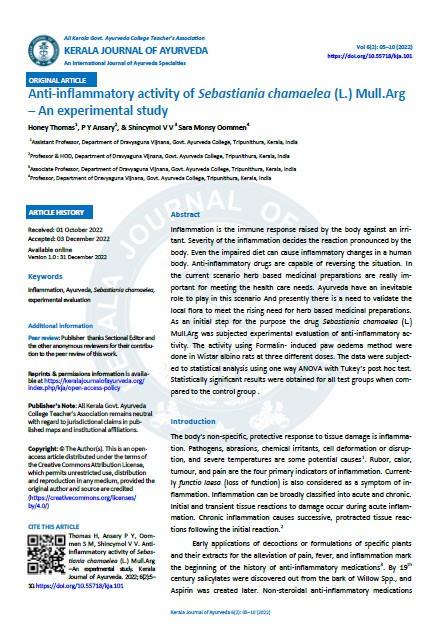Anti-inflammatory activity of Sebastiania chamaelea (L.) Mull.Arg – An experimental study
DOI:
https://doi.org/10.55718/kja.101Keywords:
Inflammation, Ayurveda, Sebastiania chamaelea, experimental evaluationAbstract
Inflammation is the immune response raised by the body against an irri-tant. Severity of the inflammation decides the reaction pronounced by the body. Even the impaired diet can cause inflammatory changes in a human body. Anti-inflammatory drugs are capable of reversing the situation. In the current scenario herb based medicinal preparations are really im-portant for meeting the health care needs. Ayurveda have an inevitable role to play in this scenario And presently there is a need to validate the local flora to meet the rising need for herb based medicinal preparations. As an initial step for the purpose the drug Sebastiania chamaelea (L.) Mull.Arg was subjected experimental evaluation of anti-inflammatory ac-tivity. The activity using Formalin- induced paw oedema method were done in Wistar albino rats at three different doses. The data were subject-ed to statistical analysis using one way ANOVA with Tukey’s post hoc test. Statistically significant results were obtained for all test groups when com-pared to the control group .
References
Tortora Gerard J, Derrickson Bryan. Principles of Anatomy and Physiology. 15th ed. New Delhi: Wiley; 2016
Underwood James, Cross simon. General and Systematic Patholo-gy. 6th ed. New York: Churchill Livingstone Elsevier; 2013
Rainsford K D. Anti-inflammatory Drugs in the 21st Century. Sub-cell Biochem [Internet]. 2007; 42:3-27. Available from: https://pubmed.ncbi.nlm.nih.gov/17612044/
Tripathi K D. Essential of Medical Pharmacology. 7th ed. New Delhi: Jaypee Brothers medical publishers; 2013
Manilal K S. Hortus Malabaricus and Ethnoatrical Knowledge of Ancient Malabar. Ancient Science of Life. 1984; 4(2): 96-99
Sriraman Namboodiri D. editor. Yogamrutam. 3rd ed. Alappuzha: Vidyarambham Publications; 2004. p78.





